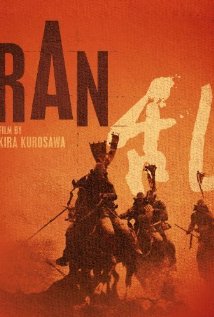
RAN/CHAOS
Japan, 1985, 162 minutes, Colour.
Tatsuya Nakadai.
Directed by Akira Kurosawa.
Ran/Chaos is a fine interpretation of Shakespeare’s King Lear. It is also magnificent to look at, brilliant colour photography, many outdoor sequences, including extraordinary battle sequences, solemn interiors.It is the work of classic Japanese film director, Akira Kurosawa, age 75 the time of making the film.
Kurosawa had emerged as a young director in the 1940s and, by 1949, with Rashomon, he had established an international reputation only to be enhanced during the coming 40 years with many Samurai dramas, contemporary dramas like Ikuru, and classics such as The Seven Samurai and his adaptation of Shakespeare’s Macbeth, Throne of Blood. In later years he began to make films in colour including films like Kagamusha, Dersu Uzala.
While there are no Shakespearean lines in this film, and the director altered aspects of the tragedy, especially the Lord having three sons rather than three daughters, but the outline the play is very clear. The powerful Lord has spent his life conquering local kingdoms and now wants to divide his kingdom between his sons. Two of them are flattering, the other blunt and critical. The Lord relies on the two allegedly loyal sons but the oldest, urged on by his wife who still resents her kingdom being conquered by the Lord, reduces his father’s retinue and sends him onto his younger brother. And the wife has designs on the younger brother as well, exiling his wife.
There are Japanese equivalents of the loyal and perfidious Dukes in Shakespeare’s play as well as loyal friends and, particularly striking, the fool who is a mirror to the Lord’s stupidities and madness. There are the scene of madness on the heath where the Lord has lost his reason, his being reunited with his son, but a very pessimistic ending with most of the characters dead.
But, Kurosawa has excelled in his filmmaking and bringing Shakespeare’s story alive.
1. The film considered a masterpiece, chorus and his career, range of films, treatments, adaptations of the classics? The move to colour in his later films? Made when he was 75?
2. The colour photography, the costumes, sets, landscapes? The dramatic sequences? The battles? The musical score?
3. The title, the focus on the era in Japan? The Great Lord and his life of conquests, the end of his rule, giving the castle is to his sons, their jealousies and vengeance, the consequences?
4. The film as an adaptation of NE, To Lear? Shakespeare’s plot and the variations, without Shakespeare’s text? The two Great Lord, his kingdoms, bequests to his sons Rutherford and daughters, the older son and his vengeful = spouse credits is, his revolt, his spouse and his brother, the sale of his wife? Those loyal to the Great Lord? Those who betrayed? The younger son and his forthrightness? The brothers and their being the equivalent of the three sisters? The humiliation of the Great Lord, the diminishment of his soldiers, allegedly because of their rowdiness, his being expelled, going to the fields, has grown madness? The role of the Fool, echoing the themes, mirroring the behaviour of the Great Lord? Accompanying him in all his difficulties? The blind brother? Those loyal to the Great Lord? His younger son, supporting him, the father’s apology, the sadness of the deaths, sadness in the kingdoms?
5. The Great Lord, his character, age, life of war, those wanting vengeance on him? The meeting, his sleep, his dream, the divisions of the kingdom, his sons professions of loyalty, the younger son and his blindness? Tango, the servant and his support and frankness? Exile? The Lord in attendance, the marriage deals? All taking place in the open Western Mark
6. the older son, his wife, her dominance and challenge, his turning against his father, the diminishment of the troops, humiliating his father, making them sit lower, interchange with the wife? His anger, going to his second son?
7. The intrigue between the two sons, or warning against their father, the role of the spouse, her betrayal, sexual attraction, seducing the brother, getting rid of his wife? Her motivations?
8. The role of the fool, in the court, mimicking, mining, foolishness reflected in the wind is full?
9. The King, going to the fields, the flowers and grass, the sheaves on his head, his madness? Moments of clarity? Going to the cave, thinking he was dead? The impact of his son’s treachery? His shame about his youngest son?
10. The younger son, going to his father, the reconciliation, the apology? Tango, loyalty? The battles and deaths?
11. The blind, his moment at the end?
12. The film of the battle sequences, the fastness, fastness, no special effects, camera work, editing and pace? The spectacle?
13. The overall impact? Audiences having an interpretation of Shakespeare, of the tragedy of king Lear